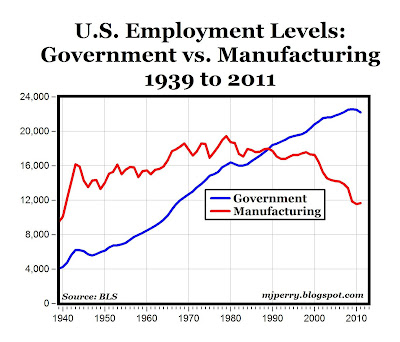True, but that figure is gov't vs. manufacturing, not gov't vs. private altogether. What are the figures, I wonder, about things like service industries, professions, clerical and administrative positions, etc.? It's no secret that the U.S. doesn't produce as much "stuff" as it used to, but it'd be interesting to see how all private employment combined would compare to government employment.
That blog is also hardly what I'd call analytical. Or at least the blog post itself isn't. It's a collection of quotes which, in and of themselves, don't tell you anything. The WSJ quote is particularly laughable, and is exactly the kind of thing I've been talking about in terms of framing the debate. The quote reads:
"If you want to understand better why so many states—from New York to Wisconsin to California—are teetering on the brink of bankruptcy, consider this depressing statistic: Today in America there are nearly twice as many people working for the government (22.5 million) than in all of manufacturing (11.5 million). This is an almost exact reversal of the situation in 1960, when there were 15 million workers in manufacturing and 8.7 million collecting a paycheck from the government (see chart above).
The quote IMPLIES a causal connection between the decline in manufacturing and the rise in government employment and subsequent bankruptcy of federal and state governments. Frankly, I'm not so sure that the rise or decline in either of those two statistics has anything to do with the other, mostly because I don't see working the line at a Chrysler plant as translating particularly well to working for an administrative agency in the government.
In that chart, there are TWO lines at work, and no reason to assume -- or accept the quote's unspoken premise -- that the two are intrinsically connected. Now, accepting, for the sake of argument, that the figures the chart features are themselves accurate, then it's true that government jobs increased, and private jobs decreased. That, however, begs the question of why.
The WSJ quote sets the reader up to jump to the "obvious" conclusion that the private sector declined BECAUSE the public sector increased. It's bad enough that the quote and the blog don't address the whys or hows of
either phenomena taken separately, but the quote specifically seeks to LINK the two phenomena together. This is an argumentation/persuasion tactic designed to pull the wool over the reader's eyes, or at least to persuade the reader to agree with the writer's underlying argument (to wit: government jobs = bad). But ask yourself this, for a second.
Did the private jobs disappear
because government jobs were more attractive to people? Or did the government jobs increase
because private manufacturing employment tapered off with further globalizaton and outsourcing of labor -- in other words, you work for the government because you CAN'T get a job anywhere else now that those jobs have gone overseas? Or do the two have anything at all to do with each other?
The quote in the blog seems to suggest that "government" and "manufacturing" jobs are two sides of a scale where weight is automatically transferred from one side to the other. I don't buy that. Certainly I don't buy it without more information to make the case. It's just too easy to demonize EITHER end of the argument by accepting the IMPLICIT premise that the two are necessarily connected. Again, this is what I've been talking about with framing the debate. Someone throws out a position and frames the debate in a particular way, and you're stuck arguing with them on their chosen ground. Don't fall for it. Question the BASE of the argument, not just the superstructure.
Regardless, if we accept the proposition that there is a causal connection between the two phenomena, then I wonder what the "freedom" argument would be in addressing that situation. Would firing all those government workers mean they'd go get jobs in manufacturing all of a sudden? Or would they simply be unemployed because their skills aren't transferrable?
To tie the whole debate back to the Ayn Rand thing and my points about "freedom" previously, if we assume that "less government = more freedom," well, what has less government gotten in this case? On the one hand, you could argue that less government gave corporations the freedom to go overseas to find cheaper workers. On the other, you could argue that, as the government grows, the people are more likely to have to pay higher taxes, or to lose their government jobs as taxes stay as-is and budgets are cut. So you give freedom with one hand and take with the other? Or maybe the term "freedom" is simply tossed around too loosely.

